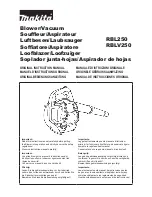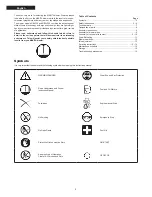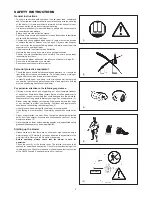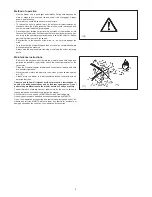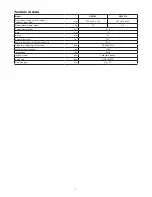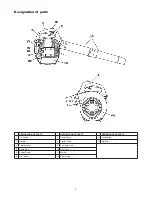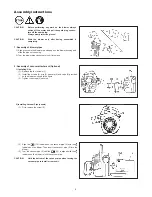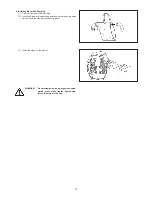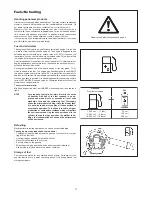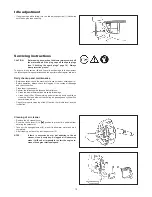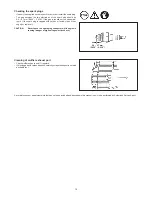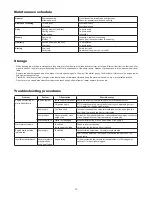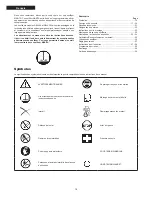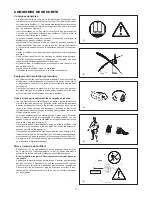
4
5
Start the blower only in accordance with the instructions.
Do not use any other methods for starting the engine ! (6)
Use the blower and the tools supplied only for applications specified.
Start the blower engine only after the entire assembly is done.
Operation of the tool is permitted only after all the appropriate ac-
cessories are attached!
The engine is to be stopped immediately if there are any engine
problems.
When working with the blower, always wrap your fingers tightly around
the handle, keeping the control handle cradled between your thumb and
forefinger. Keep your hand in this position to have your machine under
control at all times. Make sure your control handle (and grip for vacu-
um attachment) are in good condition and free of moisture, pitch, oil or
grease.
Always ensure a safe, well-balanced footing.
Only use outdoors.
Operate the blower in such a manner as to avoid inhalation of the ex
-
haust gases. Never run the engine in enclosed rooms (risk of suffocation
and gas poisoning). Carbon monoxide is an odorless gas. Always ensure
there is adequate ventilation.
Stop the engine when resting and when leaving the blower unattended.
Place it in a safe location to prevent danger to others, setting fire to com
-
bustible materials, or damage to the machine.
Never lay the hot blower onto dry grass or onto any combustible
materials.
Never operate the engine with a faulty exhaust muffler.
Stop the engine during transport (7).
Position the blower safely during car or truck transportation to avoid fuel
leakage.
When transporting the blower, ensure that the fuel tank is completely
empty.
Refuelling
Stop the engine during refuelling (7), keep well away from open flame (8)
and do not smoke.
Do not attempt to refuel a hot or a running engine.
Avoid skin contact with petroleum products. Do not inhale fuel vapor.
Always wear protective gloves during refuelling. Change and clean pro-
tective clothing at regular intervals.
Take care not to spill either fuel or oil in order to prevent soil contamina-
tion (environmental protection). Clean the blower immediately after fuel
has been spilt. Allow wet cloths to dry before disposing in proper, covered
container to prevent spontaneous combustion.
Avoid any fuel contact with your clothing. Change your clothing immedi-
ately if fuel has been spilled on it (danger hazard).
Inspect the fuel cap at regular intervals making sure that it stays securely
fastened.
Carefully tighten the locking screw of the fuel tank. Change locations to
start the engine (at least meters away from the place of refuelling) (9).
Never refuel in closed rooms. Fuel vapors accumulate at ground level
(risk of explosions).
Only transport and store fuel in approved containers. Make sure stored
fuel is not accessible to children.
When mixing gasoline with two-cycle engine oil, use only gasoline which
contains no ethanol or methanol (types of alcohol). This will help to pre-
vent damage to fuel lines and other engine parts.
–
–
–
–
–
–
–
–
–
–
–
–
–
–
–
–
–
–
–
–
–
–
(6)
(7)
(8)
(9)
Resting
Transport
Refuelling
Maintenance
Tool Replacement
●
●
●
●
●
3 meters
Summary of Contents for RBL250
Page 86: ...86 ...
Page 87: ...87 ...
Page 88: ...Makita Corporation Anjo Aichi Japan www makita com 885223 996 IDE ...

